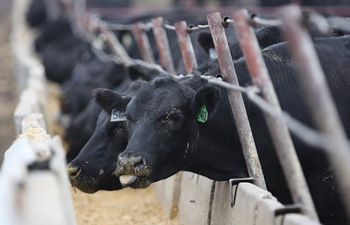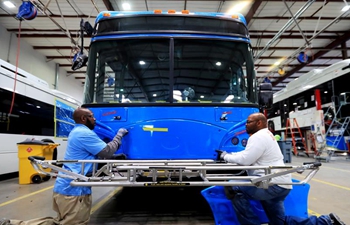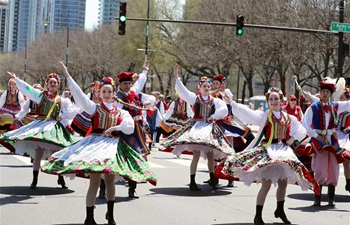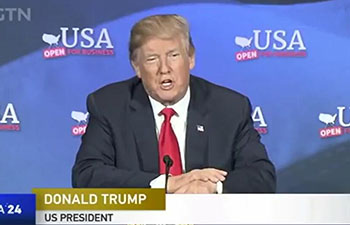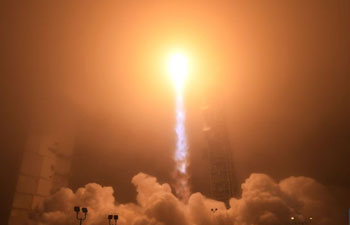By Xinhua writers Yang Shilong, Zhang Chunxiao, Zhang Mocheng
DES MOINES, the United States, May 8 (Xinhua) -- At the backyard of her brick-built homestead, Martha Kimberley was discussing with two potential contractors about how to restore the beauty of the weathered wood patio.
It was last Thursday, a rainy day with sunny intervals.
Dozens of yards away, her husband, silver-haired Rick Kimberley, was talking on camera with a crew of Xinhua reporters from New York City in front of the shiny, silver grain bins.
Moments ago, about 60 visitors from China's Guangdong Province, had just left their rolling expanse of corn and soybean fields after a walk following in the footsteps of Chinese President Xi Jinping.
In 2012, Xi, then Chinese vice president, visited the Kimberleys' family farm, a half-hour drive from Des Moines, capital of Iowa State.
Since then, greeting Chinese visitors and granting interviews to China's media outlets have been Rick's and Martha's new daily routines.
"I'd like to do the patio with cement this time, and make it better withstand heavier foot traffic. We've never expected so many visitors," Martha chuckled.
AMBASSADOR FOR MODERN FARMING
"We had the great fortune to have President Xi come to our home and our farm, and we never realized at the time how great that would be, and how that would change our lives. It's been an opportunity that we never expected," Rick said. "We've had probably thousands of Chinese visitors since."
"About one of every three or every four rows of soybeans grown in my farm are destined for China," he said. "Definitely the good relationship is good for both countries."
In reality, Rick has also become an ambassador for modern farming methods in China. He has been to China 15 times in recent years to talk about precision farming and other tricks of his trade.
After all, it is an eye-opener for Chinese visitors that Rick and his son, Grant, harvest more than 4,000 acres of corn and soybeans with a couple of hired hands and massive combines whose computers precisely track yield, moisture and other key statistics for each row and acre.
North China's Hebei Province, Iowa's sister state, is building a farm based on the model of the Kimberleys' farm, showcasing their ways of farming that include everything from grid sampling soils to using GPS and biotechnology seeds. The project is the first phase of a massive research and agri-tourism park in the major cultural province.
LOVE RELATIONSHIP WITH CHINA
"As population increases, we'll have less land to farm, so we're gonna have to become better and more productive, making better use of the land," Rick said.
"You know in my great great grandfather's day, they used horses as their power source. My grandfather bought maybe (the) first tractors back in the 1930s, a very small one... Today, I have 240 planners. We have 12 row corn pickers," he added.
During his last visit in China, Rick was bestowed with more acclamation: He became honorary dean of the Kimberley Agricultural Business School at Weinan Normal University, in Shaanxi Province, northwestern China.
The 68-year-old man was a little astonished by the Asian country's huge population and progress when he first visited Beijing.
"It's a huge population, I was impressed. Sometimes people (here) get the wrong impression that China still hasn't progressed as far as they have, but you know there are areas just very modern and that's something I realized (during my visits)," he said.
"It helps if you can talk to people face to face. It really does make a big difference," he said.
As for the current trade tensions between the United States and China, Rick said he believes the two largest economies in the world will eventually work out their differences.
"We've worked with China for many, many years in soybeans, and so want that to continue," Rick said. "I believe the U.S. and China will work out a good solution."
"Because it's a two-way conversation, there's some give and take on both sides. You know it's the best for both countries to work together and continue our trade," he said. "We love our relationship with our friends in China."








